We watch several movies a week. Every Friday, we'll talk a little about some of the movies we watched that we felt were Worth Mentioning.
SHANG-CHI AND THE LEGEND OF THE TEN RINGS (2021)
When it was announced back in 2005 that Marvel was getting into the film production business, the list of projects they were aiming to bring to the screen included Captain America, The Avengers, Nick Fury, Black Panther, Ant-Man, Cloak & Dagger, Dr. Strange, Hawkeye, Power Pack, and Shang-Chi. Some of those characters reached the screen sooner than others, Cloak & Dagger went to television, and we still haven't gotten any Power Pack projects, but sixteen years after his movie was first announced a Shang-Chi movie was finally released in 2021, directed by Destin Daniel Cretton from a screenplay he wrote with Dave Callaham and Andrew Lanham.
Shang-Chi is not a character I had much familiarity with; in fact, all I really knew about him was that he is known as the "Master of Kung Fu" and issues of his comic book can be seen in Friday the 13th Part III. I was very interested to be introduced to him with a movie, though, especially since this movie promised to bring some martial arts movie style of action into the Marvel Cinematic Universe. The Shang-Chi film was made even more intriguing by the fact that the filmmakers changed the character's lineage. In the source material, Shang-Chi is the son of a character that was not created at Marvel, they simply licensed the comic book rights to this character because he's well known: master criminal Fu Manchu, created by author Sax Rohmer in 1913. Marvel eventually let go of the Fu Manchu rights and changed the name of Shang-Chi's father to Zheng Zu - but for the movie, they used this opportunity to replace the legendary Fu Manchu with a popular villain from the comics, The Mandarin.
The Mandarin is a character Marvel fans have been waiting to see for a long time, ever since the first Iron Man movie established the presence of a terrorist group called the Ten Rings, obviously a nod to the ten rings worn by The Mandarin, rings powered by alien technology. It seemed a given that The Mandarin would someday be revealed as the leader of this group, and it originally looked like Iron Man 3 was going to be all about Iron Man battling The Mandarin, as played by Ben Kingsley. But writer/director Shane Black pulled a bait and switch on viewers with that one; Ben Kingsley was actually playing an actor Trevor Slattery, hired by the film's true villain Aldrich Killian to star in propaganda videos that draw attention away from Killian's nefarious activities. If there was a "Mandarin" out there leading the Ten Rings, we never saw him.
Until we meet him in Shang-Chi and the Legend of the Ten Rings, where an amalgamation of The Mandarin and Fu Manchu is revealed to be a man named Xu Wenwu, played by Tony Leung. Wenwu is in possession of ten mysteriously powerful, possibly alien in origin rings that he wears around his forearms rather than on his fingers like in the comics (because Marvel felt powerful finger rings would be too similar to the Infinity Stones that Thanos stuck in his gauntlet). Wearing these rings makes him immortal, and he uses their power to conquer lands, control governments, and collect riches. For a thousand years, he was a terrible person... but when he attempted to invade Ta Lo, a hidden village said to be home to mythical creatures and ancient magic, he was warded off by Ta Lo resident Ying Li (Fala Chen). And as they fought, they fell in love. They got married, they had two children - Shang-Chi (Simu Liu) and Xialing (Meng'er Zhang).
By present day, Ying Li has died, Wenwu has reverted to his old ways, and Shang-Chi has cut ties with his family after his father ordered him to carry out an assassination when he was a teenager. Now he's working as a valet in San Francisco alongside his best friend Katy (Awkwafina) and disregarding his potential. But we haven't even seen ten minutes of Shang-Chi's slacker American lifestyle before his peace is disrupted by people connected to his past, causing him to bust out some impressive martial arts moves. The attackers, who work for Wenwu and include a dude who's called Razor Fist (Florian Munteanu) because he has a super-charged, collapsible machete as a prosthetic in place of his right hand, are there to steal a pendant Shang-Chi was given by his mother. Since Xialing has a matching pendant, Shang-Chi is afraid they'll be going after her as well. So it's time for a family reunion, starting with a visit to the fight club that Xialing runs, where we get an unexpected cameo from Doctor Strange's pal Wong (Benedict Wong) and Abomination, the monstrous villain from The Incredible Hulk.
Martial arts fights do ensue; there's a standout encounter with a masked assassin called Death Dealer (Andy Le) and even Shang-Chi and Xialing have a fight because she's upset that he abandoned her, but those ten rings ensure that not all of the altercations in the film involve the strength of fists and feet, and things get even more fantastical once Wenwu decides to try invading Ta Lo again - using information that was hidden in those pendants. By the time end credits roll, we have seen all sorts of mythical animals make their way across the screen, including a giant beast called Dweller-in Darkness, bat-like creatures that suck out souls, and even a dragon known as the Great Protector. The climactic action sequence is massive, and while I had been hoping for more old school martial arts fights when I started watching this movie, I did enjoy where it went.
Wenwu doesn't call himself The Mandarin, and this iteration of the character probably still isn't quite what fans had in mind when they said they wanted to see The Mandarin in a movie, but Leung does a great job in the role and the character works for the story being told. I can't comment on whether or not Shang-Chi lives up to his comic book counterpart, but I do know that Liu made the character as presented in the movie a likeable hero who I was rooting for. I was concerned that Katy might be annoying, tagging along through the whole movie, but she turned out to be a fun presence and I liked Awkwafina's performance. Zhang also makes a strong impression as Xialing, and Michelle Yeoh brings her greatness into the second half. Also adding to the entertainment and insanity is Ben Kingsley, reprising the role of Trevor Slattery, the fake Mandarin who ended up being held captive by the real Mandarin. And now he has a strange little creature as a sidekick.
I had a really good time watching Shang-Chi and the Legend of the Ten Rings. I liked the action, I liked the characters, and the score composed by Joel P. West was pretty cool, too.
COME TO DADDY (2019)
Directed by Ant Timpson from a screenplay by Toby Harvard, Come to Daddy is a very weird movie - but I found its unique brand of weirdness to be highly enjoyable.
Elijah Wood stars as Norval Greenwood, whose long-lost father has gotten in contact with him after being absent for almost his entire life and summoned him from his home in Beverly Hills to an oddly constructed home on the Oregon coast. It isn't long before Norval is wondering why his father Brian (Stephen McHattie) wanted him to come here, because - despite Norval's attempts to impress his father by saying he produces "blazing beats" and is good friends with Elton John - the older man is extremely unpleasant, openly antagonistic, and insulting. Brian appears to hate Norval... but then he drops dead.
The movie still has a good hour to go at that point, though, so it's safe to say that not all is as it initially appears. Things get more complicated and weirder from the moment Brian keels over. Not only do we get Norval having to continue to share the house with his father's corpse because the local morgue has a flooding problem, but the story takes twists and turns that lead to a chained-up man with one ear, a man who uses a pen dipped in excrement as a weapon, a dominant prostitute, and explosions of violence that show us sights like destroyed groins and exposed brains.
Things get crazy on the Oregon coast, and I had a blast as Timpson and Harvard took Norval on a bizarre journey... and let me go along with him.
ACHOURA (2018)
Director Talal Selhami's Achoura is not a film that's interested in giving the viewer all the information they need right up front. Selhami and co-writers Jawad Lahlou and David Villemin chose to leave us in the dark for a long stretch of the movie, only giving sporadic bits and pieces of information while the story jumps back and forth in time and we're shown strange, bewildering visuals. It isn't until we're about an hour into the film's 92 minute running time that it finally becomes clear exactly what's going on – and since Selhami holds off on allowing the audience to understand the full story for that long, some viewers might find this movie to be a very frustrating experience.
The film's approach to doling out information also makes it quite difficult to write about Achoura, because Selhami apparently didn’t want the viewer to know much about it in advance. Once you've read any kind of plot synopsis, you've already gotten more of a head start on understanding the movie than you're supposed to have… So I'm going to try to avoid giving away too much.
What I can say is that the film is set in Morocco and begins during the titular religious celebration (also known as Child's Night), which involves children splashing water on each other and gathering around a bonfire. Two children leave the celebration, going off through a cornfield and soon arriving at a crumbling old mansion, which turns out to be home to a demonic, child-eating creature called Bougatate. Jump ahead some decades and we're introduced to a bunch of adults – Younes Bouab as Ali, Sofiia Manousha as Nadia, Iván González as Stéphane, Omar Lotfi as Samir – who have obviously come in contact with Bougatate at some point in their past, but most of them have done their best to wipe that experience from their memories. That's why the viewer has so little information for most of the movie, because the characters we're following don't have a firm grasp on what’s going on, either.
The actors do fine work in their roles and they're given some intense material to work with, but I was left feeling that the story would have been more effective if it weren't told in such a fragmented way. If we had gotten to know the characters better and really care about them before seeing them deal with difficult situations, we'd be more likely to get emotional with them. The Nadia character also occasionally felt underwritten, especially in moments where she just stands and stares even when people's lives are in danger and she could be doing something to help out.
Achoura falls a bit short of potential it could have reached with some restructuring and some tweaks to the script, but it holds up as a solid creature feature overall. If Guillermo del Toro decided to produce an adaptation of Stephen King's It that was set in Northern Africa, the result would probably be something like this.
Achoura has come along about a decade after Selhami made his feature directorial debut with a horror fantasy film called Mirages, and hopefully we won't have to wait another decade to see his next feature film. I haven't seen Mirages, but Achoura shows that he is a talented genre filmmaker.
The Achoura review originally appeared on ArrowintheHead.com
BATMAN: SEASON ONE (1966)
The 1960s Batman television series established a formula in its very first episode, and through the thirty-four episodes of the show's first season it stuck to that formula so firmly that they were able to use the exact same footage every other episode. Batman aired twice a week, telling a two-part story every week, and the first episode of each of those two parters starts in the same way. Some kind of criminal event happens in Gotham City, then the overwhelmed authority figures Commissioner Gordon (Neil Hamilton) and Chief O'Hara (Stafford Repp) realize they can't handle the case on their own, so they have to seek assistance from costumed hero Batman (Adam Ward), who is a "duly deputized agent of the law", and his "boy wonder" sidekick Robin (Burt Ward). Batman and Robin get word that Gordon and O'Hara need their help while they're hanging out in their civilian clothes - they're actually wealthy philanthropist Bruce Wayne and his teenage ward Dick Grayson. Behind a bookcase in Wayne's mansion there are fireman's poles that lead down into the Batcave, home to the Batmobile and gadgets like the Crime Computer, later be known as the Batcomputer. When Bruce and Dick start sliding down those poles, the episode cuts to the famous animated title sequence, accompanied by a theme song that is incredibly popular even though it only consists of one repeated word: "Batman". After the title sequence, we see that Bruce and Dick have somehow changed into their Batman and Robin costumes during the slide down the poles. They rush to the Batmobile and go speeding out of the Batcave - and the footage of them reaching the bottom of the poles, going to the Batmobile, and driving out of the cave was used seventeen times during season one. Every other episode we see the same thing.
Batman had its formula, but it was much less concerned with continuity. The episodes in the two-parters were directly connected, of course, but other than that the events of one two-parter would have little to no impact on the next week's two-parter. Any bit of continuity on the show was very minor; executive producer William Dozier really just wanted to give viewers a standalone adventure to watch every week. The show especially didn't care about origin stories, as from episode one we're dropped into the midst of Batman's crimefighting career. While many Batman adaptations focus on the death of Bruce Wayne's parents when he was a child, that event is only mentioned in a line of dialogue the first time we see Bruce. His parents were murdered by dastardly criminals, and that's all the viewer needs to know about it. We get less information about Dick's parents. It's never explained why this teenager and his Aunt Harriet (Madge Blake) are living with Bruce Wayne and his butler Alfred (Alan Napier) - who, unlike Aunt Harriet, is very aware of the crimefighting Bruce and Dick get up to, and actually gets involved on occasion.
In the comics, Batman is known to refer to Superman as a "boy scout", which I suppose sounds better than calling him a "goody two shoes", but it doesn't get any boy scoutier than the version of Batman on this show. Adam West's Bruce Wayne is as pure and noble as it gets, and he always has a lesson to teach his young ward. That may not be as cool as the dark and brooding Batman / Bruce Wayne that's been so popular in recent decades, but this goody two shoes Batman is fun to watch and West is perfection in the role. Robin, I'm less fond of. I find that he goes back and forth between irritating (every time he's fussing over his school work) to, at times, downright creepy. There's a shot of Robin laughing during a fight in one of the first season episodes that is disturbing to me.
Nearly every villain Batman and Robin run into over the course of the season, from major to minor, is someone they have already crossed paths with on previous adventures we didn't see. The Riddler (Frank Gorshin), The Joker (Cesar Romero), The Penguin (Burgess Meredith), these career criminals are already established before viewers meet them for the first time. Prison time has even been served before the show starts! These villains are already old news for Batman and Robin, but they still have a lot of trouble to cause, and their schemes in their first appearances are tied to their past experiences with the crimefighters. The Riddler tricks Batman into assaulting him so he can file a lawsuit against him, which would force Batman to reveal his identity in court if it went through. The Joker makes his own version of Batman's utility belt. The Penguin figures out a way to get Batman and Robin to inadvertently plot his crime for him. Speaking of old news - Catwoman is mentioned as an imprisoned criminal several episodes before we ever see her. Unlike the previously mentioned villains, Catwoman was not played by the same person for the entire run of the show. (Well, almost the entire run in Gorshin's case. He was briefly replaced during season 2.) For her season 1 appearance, she was played by Lee Meriwether, whose performance is surprisingly subdued compared to some of her fellow actors on the show and therefore comes off as quite sinister, even with all the cat puns she drops.
The Joker is known as Batman's greatest villain, so you'd probably expect that he would be the first villain to appear on the show. He wasn't, though. The show got started with The Riddler, which apparently would have been especially surprising to Batman comic book readers at the time, because he wasn't a popular character before this show. Introduced in 1948, he had only been in four issues of the comic before the Batman TV show boosted his status. Gorshin did an awe-inspiring job of making his Riddler come off like a total lunatic... although when the second episode ends with The Riddler telling jokes to a room full of people he has dosed with laughing gas, it kind of still makes you wonder why it wasn't The Joker doing this. Romero and Meredith both turn in iconic performances as The Joker and The Penguin as well; it always amuses me to see that Romero had his Joker makeup applied over his mustache, and Meredith's Penguin laugh is unforgettable. If you don't like those three you might as well skip watching Batman '66, because the show brings them back again and again. Just within this season, The Riddler is the focus of four stories (eight episodes), and The Penguin and The Joker both get three stories / six episodes. There's twenty of the season's thirty-four episodes just taken up by them. Some of their schemes are interesting, some not so much (I really don't like the episodes about Joker trying to corrupt high school kids), but the performances are always top-notch.
A one-time villain I really liked is George Sanders as a character who existed in the comics but was renamed for the show: Mr. Freeze (who is said to have an origin story that directly involves Batman, but of course we don't see his origin, he's already an established criminal when introduced). In the source material, this character had previously been known as Mr. Zero. The name Mr. Freeze was then adopted by the comics and the character became a bit of an icon in his own right, although he has been seriously under-represented in Batman adaptations. I guess it's too difficult to mix guy who likes to freeze things into the serious and gritty atmosphere Batman adaptations often like to have... but while Batman '66 certainly leans into the silliness of the concept, Sanders actually makes the character come off as a legitimate threat to Batman and Robin. He freezes Batman in one episode, captures our heroes in the next, and Batman appears to be powerless against him in his refrigerated hideout. While he has Batman in his clutches, he forces him to have dinner with him like a villain in a Bond movie. I loved his episodes. I call him a "one-time villain" because, while Mr. Freeze would return in future episodes, he was played by a different actor every time.
False Face truly was a one-time villain, which is a shame because I found him to be kind of unnerving, with the weird mask that allows him to be the master of disguise. He earned bonus points by leading Batman and Robin into a set built to look like an Old West town; I enjoyed seeing the out-of-place heroes running around in that sort of location. Plus False Face was played by Malachi Throne, who sounds like a comic book villain himself. The goofy, hat-obsessed Mad Hatter (David Wayne) only gets one story in season 1, but he'll be back.
A villain who was created specifically for the show was Zelda the Great, a magician played by Anne Baxter - filling the role that was a man named Carnado in the comic book story her episodes are based on. Zelda helps Eivol Ekdal (Jack Kruschen) steal $100,000 from Gotham City banks on every April Fool's Day and she didn't catch on, but she wasn't supposed to, despite the fact that desperation inspires her to capture Aunt Harriet and hang her over a pot of boiling oil. It's alright, Batman gives her a pass in the end. Two other villains created for the show made their debut during season 1: Victor Buono as King Tut, who was a professor at Yale University before a head injury left him convinced that he was King Tutankhamun, and Roddy McDowall as Bookworm, who wears a reading lamp on on his head and bases his crimes on books. It would take decades for them to make their way into the comics and Bookworm never appeared on the show again, but King Tut actually had episodes in all three seasons. Based on his episodes in this first season, I couldn't tell you why. I didn't find him to be a very good villain... although his torture technique of dropping 1000 pebbles on Batman's head one-by-one then making him dance is certainly unique. Bookworm seems insane and dangerous, but I'm not disappointed to know I won't be seeing him in future seasons.
Batman '66 is known for its campy, comedic tone, which has caused some fans to write it off in the years since. It's such a goof, I had been led to believe that it just took the basic concept and built a silly show around it as a laugh - but I recently found out that many of the episodes in this season are actually based on stories taken straight out of the comics. This show has more fealty to the source material than I was ever aware of before... And honestly, I'd much rather watch Batman '66 than some of the more serious takes on Batman. This "Caped Crusader" version of the character is more entertaining to me than a "Dark Knight".

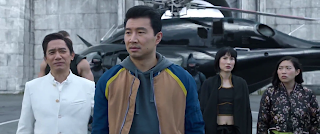
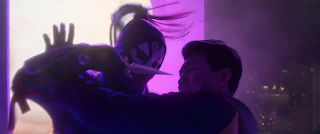


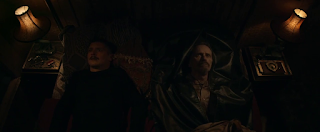

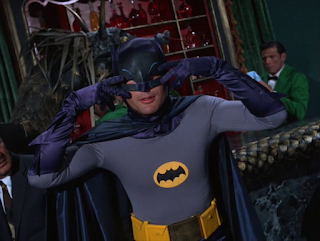





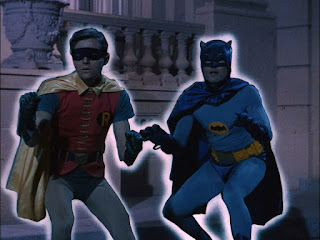






No comments:
Post a Comment